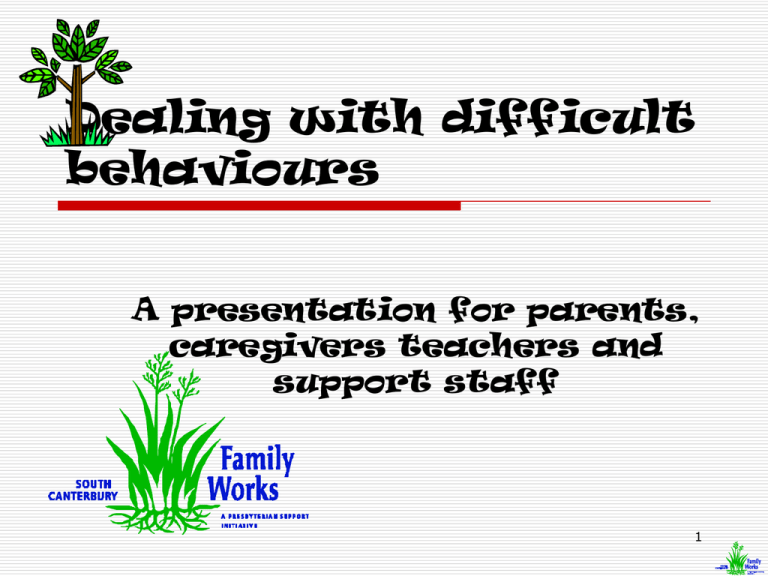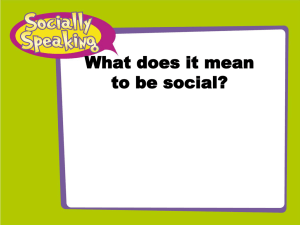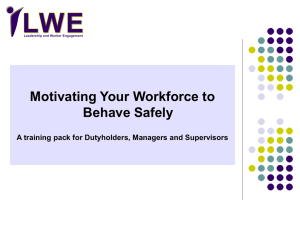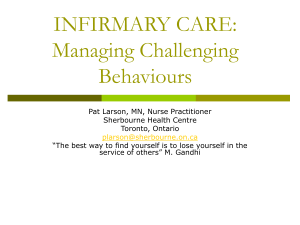
Dealing with difficult
behaviours
A presentation for parents,
caregivers teachers and
support staff
1
Dealing with difficult behaviours
So, What’s it all about
It appears that some children and teenagers
are becoming more disruptive in the home
at school, and in the community at large.
This presentation addresses some concepts
which have been used successfully to curb
and change anti-social behaviours. They
work well and can easily be used with more
traditional models.
This package supports positive behaviour
change and pro-social outcomes.
Enjoy!
2
Dealing with difficult behaviours
Dealing with difficult behaviours
We will look at
The effects of too much adrenalin in the system and what to do
about it.
The effects of lack of oxygen, and too much carbon dioxide in
the system, how it affects learning, and what to do about it.
Six steps to changing a mood – and how it might work in your
environment.
How to change a habit.
Understanding the power triangle and how toxic families affect
children and teenagers.
The difference between proactive and reactive responses and
how to up-skill a young person to respond pro-actively.
A comment about addictions, alcohol and TV violence on
children and teenagers.
3
Dealing with difficult behaviours
Dealing with difficult
behaviours
Adrenalin and Carbon
Dioxide
The problems,
the issues and
some solutions. 4
Dealing with difficult behaviours
Let’s look at adrenalin
Adrenalin is known as the bodies fight or
flight reaction.
Back in the stone age when we were
hunting and gathering there were huge,
double tusked, obviously ferocious wild
animals who came lumbering, roaring and
licking their chops after us! It was our
ability to produce adrenalin, which would in
turn flood the body and make us run faster
than we ever dreamt of, scale tall cliffs,
leap wide crevasses, and do other equally
5
daring and normally
ridiculous
feats.
Dealing with difficult behaviours
Dealing with difficult behaviours
We produce adrenalin
when …..
We produce adrenalin when we are nervous, when we
are excited, when we are scared.
When we compete, we produce adrenalin.
We produce adrenalin when we think about exciting,
scary anxiety provoking or action packed things.
If we have scary dreams, scary feelings or if we
imagine
or
day-dream
particularly
exciting,
competitive or anxiety producing things, we produce
adrenalin.
So, we see that we don’t even have to DO these
things to produce adrenalin, we only have to THINK
about them, play with them in our heads.
6
Dealing with difficult behaviours
Dealingthese
with difficult
behaviours
Think about
situations
and the adrenalin they
produce:-
Child watching 6pm news programme with re-runs
of a police shooting or major world catastrophe.
Child worrying over parents arguments – re-runs
last night over and over in head.
Child dreading playtime due to bullying comment
made as s/he walked to school by older pupil.
Child plays a very exciting game of football, rugby,
soccer or hockey, then expected to settle down and
be good.
Someone played a practical joke on a child, and the
child feels a flash of anger, fear, foolishness.
7
Dealing with difficult behaviours
Dealing with difficult behaviours
Some more to think
about …
Child knows test is coming up, but is not
confident, or has parents who ‘expect’ good
marks or comments.
Child believes best friend is moving away or
fears some other form of separation.
Child playing space invaders, play stations
or any other static game where things,
people places get blown up / away etc.
Child woke up after particularly bad
nightmare, remembers parts of it which
haunts him throughout the morning.
8
Dealing with difficult behaviours
Dealing with difficult behaviours
A couple more …
Jealousy – over possessions, friends, love,
attention, ability.
Child, for what ever reason believes him/her
self lost, alone, unloved, unwanted, not cared
about etc. etc.
Child has just had an altercation with teacher,
parent, friend in the classroom, at home, on
the sports field, at the shopping centre etc.
Child, for whatever reason, forgot or was
unable to do homework or assignment for
teacher who s/he really likes.
9
Dealing with difficult behaviours
Dealing with difficult behaviours
Role of skill base and
support
None of those scenarios is that bad
on their own, and are certainly not
harmful if the child / teenager has
the skill base and support to deal with
the situation and adrenalin.
Of course the problem is when the
skill base and support is not there
and or not consistent.
10
Dealing with difficult behaviours
Dealing with difficult behaviours
The problem is the build
up
Lots of us work out appropriate ways to deal with
adrenalin – we do it instinctively.
Some of us were very cleverly taught as
youngsters.
When children are able to go outside and let off
steam - climb trees, run until all tuckered out,
walk 2 miles to school and home again, cycle 4k
to school, chop wood, have strenuous chores to
do and the like - there is not the build up of
adrenalin.
Most systems can cope with some adrenalin. The
biggest problem is the build up.
11
Dealing with difficult behaviours
Dealing with difficult behaviours
Adrenalin over-load
The problems come when there is too much
adrenalin piling up and too much activity
has gone on, maybe for too long a period,
and there is no outlet to get rid of the build
up of adrenalin.
There has been no physical activity that
doesn’t add to it (note: sending an already
adrenalin hyped up child on to the sports
field and yelling at them to compete is
going to add to the problem, not diminish
it!).
12
Dealing with difficult behaviours
Dealing with difficult behaviours
The adrenalin junky!
Another classic situation happens when we
have a youngster who has always had so
many catastrophes and anxiety/excitement
producing situations that as soon as there
is a hint of activity their body immediately
floods adrenalin (needed or not).
He or she has got used to doing this and
has become adrenalin trigger happy as it
were!
Another term for this is an ‘adrenalin
junky’!
13
Dealing with difficult behaviours
Dealing with difficult behaviours
Lets look at carbon
dioxide
This again, is a huge over simplification – but it
explains the basic principle.
There are two key areas to the lungs that we are
interested in, the upper and lower areas. When we
breathe properly we fill both parts with ample
oxygen.
The blood supply, pumped by the heart, comes and
takes some of that nice fresh oxygen from the
lower lung and takes the oxygen to the brain where
it is needed for the thinking process.
The brain needs ample supplies of oxygen,
water/fluid and a good basic nutrition to function
well.
14
Dealing with difficult behaviours
Dealing with difficult behaviours
The problem
Problems arise when there is not enough
oxygen in the lower lung – in which case it will
be filled with stale air – otherwise known as
carbon dioxide.
The carbon-dioxide is then taken round the
body (instead of fresh oxygen), eventually
ending up in the brain, where instead of
livening us up and helping us think (or problem
solve effectively) the carbon-dioxide slows the
whole brain functioning down and makes us
feel slow, lethargic, depressed, unmotivated
etc.
15
Dealing with difficult behaviours
Dealing with difficult behaviours
Breathing is important
– do some comparisons
Most people do not breathe sufficiently well to invigorate
their system with enough oxygen to reach their potential
thinking and problem solving modes.
Have a look around your classroom / friends / family etc.
and see who is breathing and moving sufficiently to get
oxygen into the lower lung.
Think about which friend or students spend most of their
home time huddled in front of a TV or play station or
computer, or sucking on a cigarette.
Compare those young people, that run about and breathe, to
the ones who spend most of the lunch break leaning up
against a wall.
16
Dealing with difficult behaviours
Dealing with difficult behaviours
Breathing and anxiety
Have you ever noticed how little you breathe when
you are anxious - people mostly hold their breath.
Or what happens in a fight - again most people
when involved in a physical fight pull funny faces,
look staunch, take a deep breath in and hold it,
then swing a wavy punch or two.
Not effective stuff for getting the brain to function.
Basically, carbon dioxide slows us down – thinking
ability, problem-solving ability, physically and
mentally. So a person’s ability to manoeuvre
themselves out of a dangerous, difficult, anxiety
provoking or thwarted situation is considerably
impaired.
17
Dealing with difficult behaviours
Dealing with difficult behaviours
Adrenalin and carbon
dioxide together
If we have too much adrenalin, plus an over supply of
carbon dioxide - not enough oxygen going around the
system – our system gets very confused.
Basically it is like taking a handful of uppers and
downers together.
The adrenalin is speeding us up and the carbon
dioxide is doing its best to slow us down.
It is all too much, so we revert to behaviour as bazaar
as we feel.
The problem is compounded by the fact that we learn
negative behaviours from doing them and getting
attention - giving a sense of power and control.
18
Dealing with difficult behaviours
Dealing with difficult behaviours
So, how do we fix it?
It’s really easy – doesn’t that make you
mad!
Get rid of any excess adrenalin, replace
carbon dioxide with oxygen, set the scene
for, and reinforce any positive behaviours.
Let’s put it into the classroom environment
– as teachers you don’t have a magic wand
to change the home environment.
19
Dealing with difficult behaviours
Dealing with difficult behaviours
Getting rid of excess
adrenalin
Remedy - Use it up with physical, non-competitive activities –
preferably first thing in the morning, after all breaks and
any highly competitive or difficult sessions.
Class room options
Skipping – it’s boring, but uses up mega adrenalin (with
the bonus they have to breathe). It also assists left/right
brain assimilation.
Star jumps – similar to skipping, no equipment needed.
Stair walking – but you have to do enough of it to wear
them down.
Running on the spot, hard; followed by some gentle
stretching – yoga or tai-chi.
On an individual level a child can learn to ask for a skipping
rope and take time out themselves.
20
Dealing with difficult behaviours
Dealing with difficult behaviours
Changing carbon dioxide to
oxygen (1)
Remedy - Breathe in such a way that both
top and bottom parts of the lungs get fresh
air.
Breathe out first so that you empty the
lungs of carbon dioxide before you start.
For some people it is such a novel
experience – having oxygen in the system
– that they feel high or euphoric!
21
Dealing with difficult behaviours
Dealing with difficult behaviours
Changing carbon dioxide to
oxygen (2)
Classroom options
Teach and do breathing techniques in your
classes.
If you know they have been in stuffy
environments open the windows and/or take
them outside for 5 minutes of fast exercise.
Teach some simple 2 – 3 minute yoga with
breathing routines. Salute to the sun is
simple and easy to learn.
Introduce a 4 – 5 minute relaxation /
breathing tape into you lesson plans.
All this can be done at home too!
22
Dealing with difficult behaviours
Dealing with difficult behaviours
Set up and reward
positive behaviours
Remedy
Just do it. Get them addicted to good behaviours not
harmful ones.
Brainstorm with other family members, friends, school
staff, supervisors, almost anyone, about your problem
children / students and ways to try and set up
positive behaviours and reward them.
Remember
What works for one person may not always work for
another. For me as an adult I find a 20 minute walk
works wonders – I don’t like the actual doing it, but
the benefits are amazing! Give me sincere verbal
stokes and I’m captivated, I’m yours!
23
Dealing with difficult behaviours
Dealing with difficult
behaviours
Six steps to changing a
mood
Instant
behaviour
modification.
24
Dealing with difficult behaviours
This works if you do it, but it
doesn’t work if you don’t!
It is not always easy to set up in a classroom
situation; but well worth the effort, if you can. It’s
easy to set up at home.
It works best in a primary school, or home setting,
where it can be taught as a technique they can use
for the rest of their life.
More organisation is needed for a High School.
Try it yourself, and see exactly how it works. Then
talk about it with your children and /or students.
Pick a real incident to demonstrate it, use yourself or
a co-operating child / student.
Make it a cool thing to do and clearly outline the
benefits of having the ability to change ones mood
(power and control).
25
Dealing with difficult behaviours
Dealing with difficult behaviours
Step 1 - Breathe
BREATHE.
Get that carbon dioxide out and the
oxygen in.
Give the brain the tools it needs to
think more appropriately.
Three good (slow) breaths – start by
breathing OUT!
26
Dealing with difficult behaviours
Dealing with difficult behaviours
Step 2 – have half a glass
of fruit-juice
HAVE HALF A GLASS OF FRUIT-JUICE.
It has to be proper fruit juice.
Apparently it is the natural sugars and vitamins
which give the body and brain a wee surge of
energy. You don’t want any extra chemical cocktails
with flavourings, colourings and taste enhances.
Failing the fruit juice, go for half a glass of water. At least
the water will make sure that the brain has some fluid
around it which it needs to send good clear messages. All to
often people dehydrate – too much coffee, cola, fizz and not
enough plain liquid.
27
Dealing with difficult behaviours
Dealing with difficult behaviours
Step 3 – Think a
pleasant thought
THINK A PLEASANT THOUGHT.
Learn to have a few pleasant thoughts you can
recall easily.
This will disengage the brain from the present
negative, unhelpful thinking pattern, on to
something else; it will also give you a little
endorphin fix, a lift and mini high.
You can use the same pleasant thought over and
over again – it is easier than having to think up new
ones!
28
Dealing with difficult behaviours
Dealing with difficult behaviours
Step 4 – Change focus
CHANGE FOCUS.
Now actively choose to think about something else
- other than what put you in the mood you wanted
to change.
If you are a stubborn person do it with all the
stubbornness you can muster, if you are a
humorous person do it with humour.
Whatever the key is - choose to think about
something else.
As human beings we have the power to think what
we want – our minds don’t rule us, we rule our
minds!
29
Dealing with difficult behaviours
Dealing with difficult behaviours
Step 5 –Move as if you
are happy
MOVE AS IF YOU ARE HAPPY.
Think about how people move when
they are happy or when they are
angry, sad or frustrated.
Act out being happy.
This in turn will make you feel better,
will lift your spirits.
30
Dealing with difficult behaviours
Dealing with difficult behaviours
Step 6 –Acknowledge what
you have just done
ACKNOWLEDGE WHAT YOU HAVE JUST
DONE.
Give yourself a reward, a pat on the back.
With all those manoeuvres going on in your
head, there is no way you can stay in the
same mood as you were.
You have also shown very clearly to
yourself and others that you have the
POWER.
(This step is extremely important)
31
Dealing with difficult behaviours
Dealing with difficult behaviours
Simple and effective
This simple technique can be taught to anyone.
The trick of course, is wanting to change the
mood in the first place.
Anyone can do it; they just have to want to.
Sometimes people are getting too much out of
being in the mood (attention, power, control)
so they don’t want to change it – so…. make
sure they don’t get the attention, power,
control.
Make sure the ones who make the change do!
32
Dealing with difficult behaviours
Dealing with difficult
behaviours
Changing a habit /
behaviour
Here are some of the theories
relevant to behaviour and
why we do them. Behaviour is
addictive because of what we
believe (true or false) we33get
out of it.
Dealing with difficult behaviours
We understand
where our
behaviour is likely to have
come from
WE ARE A MIXTURE OF:
Learned behaviour
Rebellion
What works - and
whatever works I
will use again
and again, even
if it doesn’t work
that well, or only
worked once; I
just keep hoping
it will perfect
itself.
Those behaviours I
copied from parents,
caregivers and other
significant people, or
as seen on TV!
What
works.
What hurts.
(What pisses others off)
That’s pathetic. I say I’ll never do it again. I think
and think about it. I get really stressed and sure
enough, I’ve just found I’ve done it again.
34
Dealing with difficult behaviours
Dealing
difficult
Behaviours
arewith
often
asbehaviours
much
a habit as any other addiction;
and what that means for us.
TRYING TO MAKE SENSE OF OUR HABITS / DEPENDANCY
Withdraw
Lack of skills
Poor self image
INSECURITIES
Lack of confidence
This, then,
becomes the
habit /
dependency
cycle
A need to mask
Add pressure from
parents, society or
peer pressure
And then
CONFUSED
When we stop
doing it we feel
We do something that gives us a
THRILL / HIGH / BUZZ
(which is usually anti-social)
TO GIVE US A FEELING OF
POWER / CONTROL/ ATTENTION
Dealing with difficult behaviours
35
We needDealing
to with
understand
difficult behaviours
why it is so difficult to
stop doing what we do
AVOIDING CHANGE – WHETHER I’M 5 OR 75 YEARS OLD
2. I FEEL I CAN’T COPE
So I look for things that will give me a ‘buzz’.
If I’m an adult it might be booze, workload
issues, drugs, sex, food, etc.
A young person may just pick something they
consider will give them attention, a sense of
control or power, or do ALL the above anyway!.
1. THE GOING GETS TOUGH.
Life throws a stressful situation
at me. Something I’m not sure
how to handle. I do something
stupid, I get into trouble, I tell a
lie and get caught out, I steal
something. Trouble can be big
or small. People treat me like an
idiot.
3. I THEN
Do them more and more, to try to
keep the buzz going.
If I wasn’t addicted to doing them
initially, I soon will be!
4. PROBLEM IS – I’m so busy
doing whatever it is to desperately
keep the buzz going, I don’t have
time or energy to evaluate how
good or not it really feels, let alone
look at stopping it.
36
Dealing with difficult behaviours
Dealing with
difficult
behaviours
Understand
the
basic
concepts of changing a
behaviour / habit
BREAKING THE CYCLE
A) First of all there has to be a
MOTIVATOR. A reason why you / they
would want to stop doing the old
behaviour and instead go to the bother
of doing the new behaviour.
This is usually one of these three
things:1. A CRISIS – I’m up to my armpits in
muck, I’m scared and it is clear to me
now that I’m not winning.
2. I’VE HAD ENOUGH – I’m tired, I
want to stop this game, I want to get
off, it’s not working out like I’d hoped.
3. PRIMAL SURVIVAL – This one is
more about doing it (making positive
change) for our kids, or because of our
beliefs.
B) Then we have to have CONTROL OF
OUR DEPENDENCIES. For this to
happen I need:•The knowledge of what I do and why
I do it.
•My motivation to change – the why I’d
want to.
•The specific skills and techniques
that are going to help me – related to
what I do and why.
•To see a light at the end of the
tunnel.
•A specific, step by step plan of
action, complete with achievable and
appropriate rewards.
C. GET ON & DO IT!
37
Dealing with difficult behaviours
Dealing with difficult behaviours
Food for thought
It is important that any person, young or old, working
on personal development or behaviour change begins
with the end in mind. That they have a clear mental
image of how they want to be. This sort of positive reprogramming of patterns is a most effective tool.
You can see from the diagrams that it is very necessary for the
young person to enter into dialogue and to self-express what their
present patterns actually are, clearly seeing them for what they
are, and then working out and talking about what new patterns
might be like instead.
Adults must reinforce the new behaviours at every
chance.
38
Dealing with difficult behaviours
Dealing
with difficult behaviours
Things,
information,
thoughts, discussions that
may help us change include:
I want to do it – I am clear about why and I can see that I can do it,
it is possible.
I think about it – the consequences, outcomes, exactly who will be
affected, risks and results of both the old behaviour and the new
behaviour.
I practice the new behaviour – with support, I also practice
accepting change.
39
Dealing with difficult behaviours
Dealing with difficult behaviours
Skills, skills, skills
I have the skills I can work on, to make the
change and also on handling things when I
get it wrong.
Trying to understand others.
Understanding self.
I get help with working on patience, control,
communication and respect, for me and
those around me.
Remember all this stuff is
incredibly difficult for anyone,
let alone a young person!
40
Dealing with difficult behaviours
Dealing with difficult behaviours
Motivation – the biggy!
Motivation
Why would I want to put myself
through all this.
How do I maintain, or get
enough faith in myself so that I
can reach for the goals I want?
41
Dealing with difficult behaviours
Dealing with difficult behaviours
So, the basics for changing
a behaviour are:
Label the behaviour you want to change and have a
reason for changing it.
Know what you want to do instead.
Believe you can change – see yourself doing it –
acting as you would like to be.
Understand your stress cycle – how it works for
you.
Have a list of good / positive activities you can do,
or think about to relieve the stress or even do
instead of the old behaviour.
Have a plan of action to deal with the ‘at risk’ times.
42
Dealing with difficult behaviours
Dealing with difficult behaviours
Always appreciate
When we are stressed, confused or
frightened, we will usually revert back
to old habits and behaviours – so,
extra care and planning is needed for
success.
And remember – we can only change
an old behaviour when we have a
new behaviour to replace it with.
43
Dealing with difficult behaviours
Dealing with difficult
behaviours
The Power Triangle and
Toxic Families
The effect of family buying into
the power triangle has on
children; assisting children to
develop other more effective, and
less abusive, options and models.
44
Dealing with difficult behaviours
POWER TRIANGLE - GAMES
PEOPLE OFTEN PLAY
The Power Triangle shows the roles that people often get into. It
also helps us to see how dangerous such roles can become.
This part of the programme may help us to find better ways of
working with children and teenagers, keeping us and them
safer.
This is not a nice topic, however, this is the stuff that is so often the
foundation of the lives of the people we work with.
This is the hurt, the yuck and the gore of real life.
Different people deal differently with it, some people appear
undamaged by their toxic upbringing, but ask them later and
hear the cost.
To effect change we need to assist people / children from such
backgrounds to be strong enough to make change, to break the
cycle, and for them to be able to bare that cost.
45
Dealing with difficult behaviours
Dealing with
difficult
behaviours
Roles within
the
power
triangle
RESCUER
PERSECUTOR
The softie, the
helper (enabler),
the one who tries
to do the right
thing, the meat in
the sandwich.
The one in
control, s/he who
must be obeyed,
the one who calls
the tune, the one
who must be
appeased, the
bossy bully.
VICTIM
People and children involved in the
triangle are often well able to play all three
roles – it just depends what is likely to get
them more of what they want, at that time.
The helpless one, the
hopeless one, the one
who always looks for
support or advice, the one
who depends on others.
46
Dealing with difficult behaviours
Dealing with difficult behaviours
Benefits! Who gets what out
of these roles in the triangle?
Each of the players gets benefits
from being in the triangle.
Often as one of the parties tries
to remove themselves from the
triangle, the others will sabotage
their growth.
Notice how similar this cycle is to
bullying.
47
Dealing with difficult behaviours
Dealing with difficult behaviours
DYSFUNCTIONAL HOMES ARE THOSE IN WHICH
ONE OR MOREOF THE FOLLOWING OCCUR 1
Abuse of alcohol and/or other drugs (prescribed or illicit).
Compulsive behaviour such as compulsive eating, working,
cleaning, gambling, spending, dieting, exercising and so on;
these practices are addictive behaviours, as well as part of a
progressive disease process; among their many other
harmful effects, they effectively disrupt and prevent honest
contact and intimacy in a family.
Battering of spouse and/or children.
Inappropriate sexual behaviour on the part of a parent
toward a child, ranging from seductiveness to incest.
Extended periods of time in which parents refuse to speak to
each other.
48
Dealing with difficult behaviours
Dealing with difficult behaviours
DYSFUNCTIONAL HOMES ARE THOSE IN
WHICH ONE OR MORE OF THE FOLLOWING
OCCUR 2
Parents who have conflicting attitudes or values or display
contradictory behaviours that compete for their children’s
allegiance.
Parents who are competitive with each other or their
children.
Parents who cannot relate to others in the family and thus
actively avoid them, while blaming them for this
avoidance.
Extreme rigidity about money, religion, work, use of time,
displays of affection, sex, television, housework, sports,
politics and so on; obsession with any of these can
preclude contact and intimacy, because the emphasis is
not on relating, but following the rules.
49
Dealing with difficult behaviours
Dealing with difficult behaviours
DYSFUNCTIONAL HOMES ARE THOSE IN
WHICH ONE OR MORE OF THE FOLLOWING
OCCUR 3
If one parent displays any of these kinds of behaviours or
obsessions, it is damaging to the child.
If both parents are caught up in any of these unhealthy
practices, the results may be even more detrimental.
Often parents practice complimentary kinds of pathology.
For instance, an alcoholic and a compulsive eater will
marry, and then each will struggle to control the other’s
addiction.
Parents also often balance each others unhealthy ways;
when the smothering, over-protective mother is married
to the angry and rejecting father each parent is actually
enabled by the other’s behaviour and attitudes to continue
relating to the children in a destructive way.
50
Dealing with difficult behaviours
Dealing with difficult behaviours
DYSFUNCTIONAL HOMES ARE THOSE IN
WHICH ONE OR MORE OF THE FOLLOWING
OCCUR 4
Dysfunctional families come in
many styles and varieties, but
they all share one effect they
have on children growing up in
them.
These children are to some
extent damaged in their ability
to feel and relate.
51
Dealing with difficult behaviours
Take a child
growing
up behaviours
in an
Dealing
with difficult
alcoholic home as an example
1:
If I grow up with an alcoholic parent, I grow up in
confusion. Alcohol sees to that. Alcohol, however,
does not decide how I perceive that confusion.
I carefully craft and engineer those perceptions so that with a child’s perspective and needs - I
can believe I am special, cared for, not
abandoned; that I can get some form of attention,
a sense of power, an area of control over my life
(so that I have a reason for existing).
I also devise amazing defence mechanisms in
order to live with and keep those perceptions in
tact.
52
Dealing with difficult behaviours
Take a child
growing
up behaviours
in an
Dealing
with difficult
alcoholic home as an example
2:
The defence mechanisms I create are powerful
resources that keep me alive, but as I grow and
mature those resources threaten my adult
stability; they stop me from achieving my
potential.
They siphon off energy I so badly need for growth,
to be whole, to be a person in my own right.
Early coping mechanisms can blister adult
relationships, parenting skills, job performance,
my ability to enjoy life and even life itself.
53
Dealing with difficult behaviours
Have a look at your child /
difficult
behaviours
students & Dealing
thinkwith
about
some
of
the rules they probably have to
live by.
An example of some of the rules - overtly or covertly
acknowledged -that exist in such families might include:
It’s not okay to talk about or express feelings openly – if you
do you are a sissy.
Don’t address issues or relationships directly – it’s just not
done.
Always be strong, always be good, always be perfect - or
you’re nothing.
Don’t be selfish.
Do as I say .... Not as I do.
It’s not okay to play.
Don’t rock the boat – or you’ll get eaten by the shark (never
mind just falling in the water)
54
Dealing with difficult behaviours
Dealing with difficult behaviours
Working co-operatively to
collapse the triangle
In order to get out of the triangle way of doing
things we need to find another way – to break
the cycle we need to work like this:
Power
Games
CONSULTATION
PARTICIPATION
CO-OPERATION
WE DO IT BETTER TOGETHER!
55
Dealing with difficult behaviours
Dealing with difficult behaviours
Getting out of role and being
co-operative
What could a person do to collapse the
triangle and remove themself from the
power game role that they no longer wish
to play?
PERSECUTOR / BULLY
VICTIM
RESCUER / WITNESS
56
Dealing with difficult behaviours
Why might it be better to
do the co-operative thing?
What are some
of the
advantages
that cooperative
decisionmaking has
over power
games?
57
Dealing with difficult behaviours
Dealing with difficult
behaviours
Being pro-active rather
than reactive
The difference between
proactive and reactive
responses and how to up-skill
a young person to respond
pro-actively.
58
BEING PRO-ACTIVE
There are those people who are reactive and those that are proactive. Reactive people hand over power / control to others, and thus
get more stressed. Let’s look at the difference.
REACTIVE people are:
•Affected by their physical environment.
•Into blaming others.
•Into blaming things, circumstances etc,
for their plight.
•Often overly defensive or protective.
• Dependent on others.
PRO-ACTIVE people are;
•Being responsible for their
own life.
•Driven by their own values.
•Want to feel comfortable
about taking the initiative.
Which one has the most fun and gets
more of what they want?
59
Dealing with difficult behaviours
Difference between
‘liberty’ and ‘freedom’
Pro-active people understand the difference between:
LIBERTY – which is outside of us, options to
choose from our environments - if you go to prison your
liberty is taken away.
FREEDOM
no one can take your freedom away while you are living,
breathing and thinking–
our internal power, our ability
to choose from options involving:
INSPIRATION – from the word inspire.
MEANING – your beliefs.
DIGNITY – your ability to hold your head up, walk
tall, feel proud.
60
Dealing with difficult behaviours
Freedom to choose
As human beings when we have a situation we can choose
our response.
We do not have to just react!
We have freedom to choose if our response is pro-active the choice will include.
61
Dealing with difficult behaviours
Dealing with difficult behaviours
Discussion with children
may go along the lines of:
What I’d (really!!) like to do.
The difference between what we know
to be good and bad, positive and
negative.
What else I can think of.
What my strengths and weaknesses
are and how best to utilise them.
62
Dealing with difficult behaviours
Dealing with difficult
behaviours
A comment about
addictions, alcohol and TV
violence on children and
teenagers
63
Dealing
with
difficult behaviours
The effect
of
addictions,
alcohol and TV violence on
children and teenagers
It is very simple.
Children and teenagers don’t
need them.
They don’t need to see them,
they don’t need to be party to
them and it is up to the adults
in their lives to keep them safe
from them.
64
Dealing with difficult behaviours
Dealing with difficult behaviours
The END
65
Dealing with difficult behaviours







